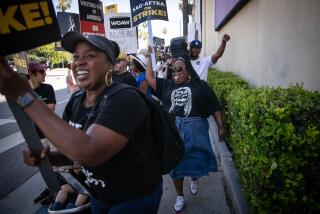How a search for Black film editors caused a firestorm on Facebook
In the wake of the Black Lives Matter protests over police brutality, film editor Ri-Karlo Handy was inundated with calls from movie industry executives looking for Black editors to hire.
Eager to spur change in his industry, the 20-year Pasadena-based editor reached out to a private Facebook group in a bid to build a list of recommendations. “Looking for Black Union editors ... please dm me your contact info!” he posted Tuesday morning on the site, which has over 14,000 members.
Handy, who owns his own multimedia company, Sunwise Media, wasn’t prepared for what happened next. By Wednesday morning he had received hundreds of responses from members of the group. Many were supportive but some white editors were openly vitriolic, accusing him of “anti-white racism” and of “reverse discrimination,” according to screenshots of the post shared with The Times.
“Those 11 words set off a firestorm in the group, leading to racist posts in the comments and a heated debate about diversity, discrimination and opportunity,” Handy said in a statement. “Several members of the group, myself included, were deeply offended by some of the responses by white editors who perceived my effort to source more editors of color as some sort of ‘reverse discrimination.’”
For the first time, the WGA West published an open letter from its membership — a call from its Committee of Black Writers for change in Hollywood.
The recent movement against racial injustice has forced many entertainment companies to address systemic racism that has minimized Black people and other people of color not only on screen, but behind the camera. Some media companies have started funds committed to social justice and pledged to improve diversity in their ranks. The action comes as Hollywood finds itself trying to bounce back after the COVID-19 pandemic halted production for several months and caused massive job losses for entertainment industry workers.
Like many facets of Hollywood, Handy said work in his field is often found through word of mouth and that he is often the only person of color on jobs.
The veteran editor, who has worked for such networks as Fox, CBS and BET, has said his post was an effort to share the opportunities with Black filmmakers.
“Nothing changes over the years if you just continue to hire the same people that you know,” Handy said. “The rooms that I’m in look the same as they did 20 years ago.”
Even though Handy wasn’t referring to any particular job opportunity in his post, several editors complained that he was potentially violating employment law or that it was racist. Among those objecting to Handy’s request was New York City-based film editor Nathan Lee Bush. He referred to it as “anti-white racism,” according to screenshots of the posts.
“All I was trying to say is: Is the antidote to past discrimination based on skin color more retributive discrimination based on skin color?” Lee Bush said in a written response. “I should have, however, realized this was not the time to bring [it] up, with tensions running so high. And certainly I could have worded these ideas much, much better. I was literally just playing a video game when I casually wrote those words.”
He added: “I had trouble ‘reading the room,’ so to speak, and to anyone I offended, I’m very sorry.” He said the case was an example of so-called cancel culture where “anyone with an unpopular opinion must be utterly and instantaneously destroyed.”
But one corporate client was quick to distance itself from the situation. “The views expressed by this individual are not acceptable, and we will no longer be using their services or allowing use of our logo on this company’s website,” said Panera Bread via Twitter after followers drew the company’s attention to the case.
The online dust-up caught the attention of directors Ava DuVernay and Gina Prince-Bythewood.
Nicole French, a lawyer and actor, found the post through her husband who is also an editor, she said. She was careful to screenshot the reactions before they were deleted, she said, and shared them on Twitter, where they drew widespread attention. Such comments are “not believed unless they are recorded,” she said.
Black film and television writers have also been calling on the industry to address the lack of representation. With a vast majority of jobs in film writing going to white writers, the Writers Guild of America West last week published an open letter from the group sharing their pain at the lack of progress.
The Motion Picture Editors Guild, Local 700 of the International Alliance of Theatrical Stage Employees, which represents 8,000 post-production professionals, did not respond to a request for comment.
“That so many white editors responded with these offensive comments shows there’s a lot more work to be done,” Handy said. “I don’t want anybody’s kids to not eat because their father or mother, or whomever takes care of them, has these feelings (...) but I do feel like we can’t pretend that it doesn’t exist. A lot of people pretend like institutional racism doesn’t exist.”
More to Read
Inside the business of entertainment
The Wide Shot brings you news, analysis and insights on everything from streaming wars to production — and what it all means for the future.
You may occasionally receive promotional content from the Los Angeles Times.







